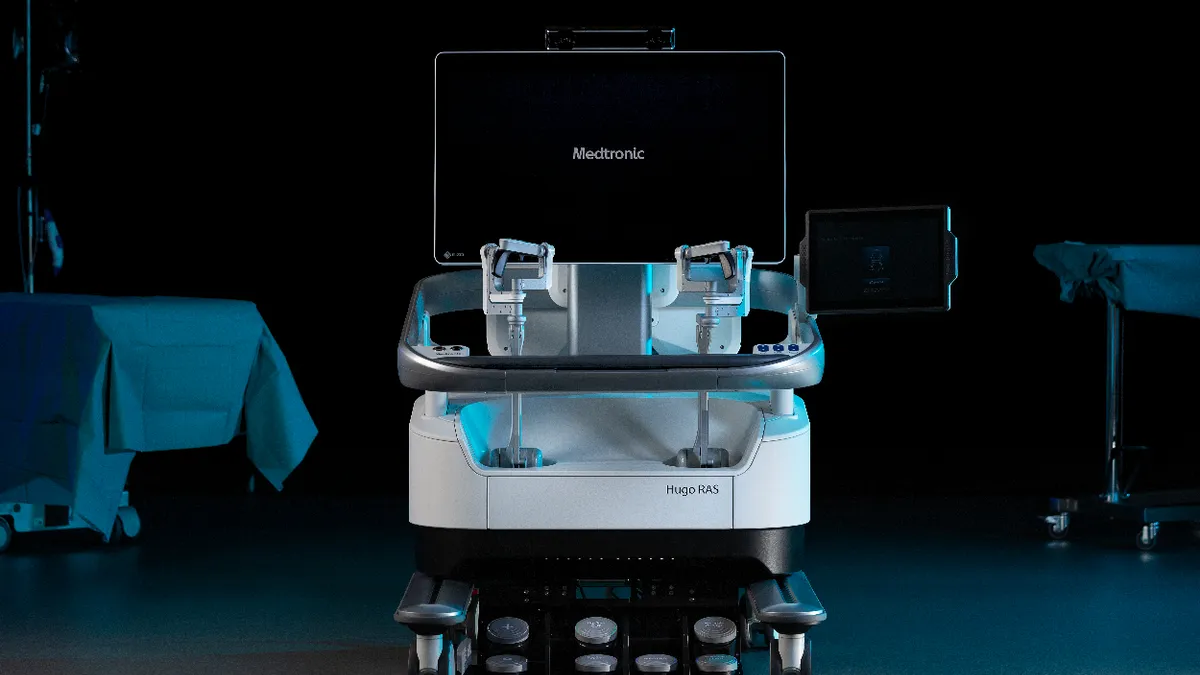Medtronic is nearing a U.S. launch for its Hugo surgical robot more than three years after receiving approval to release the soft tissue system in Europe.
CEO Geoff Martha told investors Tuesday that Medtronic plans to file for U.S. market authorization with the Food and Drug Administration by the end of March. The company is preparing for a U.S. launch of Hugo in its fiscal year 2026 — its fiscal years typically begin in late April.
Medtronic will submit its application for urology indications. Martha said the company has also completed enrollment in clinical trials for hernia and benign gynecology procedures.
Medtronic is one of the companies looking to challenge Intuitive Surgical in the soft tissue robotic space, or at least capture some share and slowly close the gap. Medtronic received a CE mark for the European market in 2021 and has been working toward a U.S. launch.
“In international markets, utilization continues to increase, and we've more than doubled Hugo procedure volume year over year,” Martha said. Coupled with a U.S. launch potentially soon, the CEO added that Hugo would be a “growth driver for our surgical business in fiscal ‘26, and a meaningful growth driver for Medtronic in the midterm.”
Martha did not detail what the expected contributions from Hugo would be in Medtronic’s next fiscal year. The medical surgical business brought in $2.07 billion in the third quarter of the company’s fiscal year 2025, representing a year-over-year decrease of nearly 2%, the only unit to show a decline.
A U.S. launch for Hugo would come amid a changing landscape for soft tissue robotics. Medtronic and Johnson & Johnson plan to take on Intuitive in the space, as well as a collection of smaller medtech firms with specialized machines.
However, Wall Street analysts have maintained that Intuitive — with its new da Vinci 5 product — would likely remain atop the market, regardless of which company comes after it.
PFA & RDN
Medtronic was the latest company to outline a bright future for pulsed field ablation (PFA). Physicians have embraced PFA over radiofrequency and cryoablation to treat atrial fibrillation since Medtronic and Boston Scientific launched products early last year, and the adoption has created one of medtech’s fastest-growing spaces.
Martha told investors that Medtronic’s cardiac ablation solutions would become a $1 billion business in its fiscal 2025 year, with “line of sight” to $2 billion as the PFA portfolio grows. The CEO did not give a specific timeline for hitting the $2 billion mark but said it would be in the near term.
“The $2 billion line of sight — they're not forward-looking statements. This is in the moment,” Martha said. “And we're not stopping at the $2 billion. That's not an end game. That's line of sight, shorter term.”
After ablation sales did not grow as expected in Medtronic’s previous quarter because of PFA supply constraints, Martha said that supply is “a lot better across the board.”
The CEO was also bullish on the future of renal denervation. Medtronic and Recor Medical are the only companies to secure FDA approval for renal denervation products, and the Centers for Medicare and Medicaid Service is analyzing establishing national coverage for the devices.
Martha expects Medicare coverage to be in place within the next eight months, opening up a “massive” opportunity for Medtronic.
“We're activating new accounts across the U.S. and helping them set up Symplicity clinics and establish care pathways so they're prepared to quickly ramp procedures when coverage is in place,” Martha said. “Upon coverage, this will be an immediate growth driver and will become a significant source of growth for the company.”












